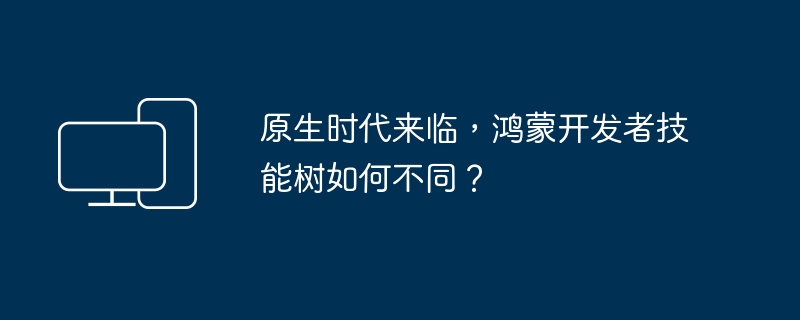Home >Computer Tutorials >Computer Knowledge >With the advent of the native era, how will the Hongmeng developer skill tree be different?
With the advent of the native era, how will the Hongmeng developer skill tree be different?
- WBOYWBOYWBOYWBOYWBOYWBOYWBOYWBOYWBOYWBOYWBOYWBOYWBforward
- 2024-02-27 09:01:181213browse

Guests | Li Ning, Xu Liwen
Organization | Yifeng
Produced by 51CTO Technology Stack (WeChat ID: blog51cto)
In January, Huawei announced the launch of the new HarmonyOS and opened applications for the HarmonyOS NEXT developer preview version. On February 6, as the Spring Festival approaches, HarmonyOS sent New Year blessings to all developers and announced that the HarmonyOS NEXT version developed based on the open source HarmonyOS - Hongmeng Galaxy Edition will be officially launched this fall to meet consumers. This news means that HarmonyOS developers will have a rare opportunity to create. At the same time, major platforms are also accelerating the adaptation and development of the HarmonyOS ecosystem, providing strong support for this important milestone.
2024 is a critical year for Hongmeng applications, and it is also a critical year for Hongmeng developers to seize opportunities. What trends will Hongmeng Ecosystem’s technological iteration bring? For small and medium-sized enterprises, how to reserve technology so that they can better invest in the innovation of Hongmeng native applications? Which tracks are currently good entry points?
T Frontline was fortunate to invite two teachers, Li Ning, core lecturer of Hongmeng Community, and Xu Liwen, MVP of Hongmeng Community, to conduct in-depth discussions and exchanges on these issues.
The two teachers gave two key points, one is ArkUI and the other is AI-assisted development. Li Ning believes that Hongmeng developers need composite skills and divides the skill tree into two parts: a direct skill tree consisting of ArkTS, C and C language, declarative development, etc., and an indirect skill tree of AI-generated coding. Xu Liwen suggested that developers should lay a solid foundation in JS & TS languages, be prepared to meet challenges, and pay attention to and learn the latest auxiliary programming tools.
At the same time, Xu Liwen also suggested that Huawei introduce generative artificial intelligence and effectively integrate it into visual programming, so that Hongmeng development tools are expected to accelerate the market win.
The following is a transcript of the exchange between T Frontline and two teachers:
T Frontline: This year is a critical year for Hongmeng’s native application era. Many people also say that this is the year when Hongmeng becomes independent from Android. Against this background, what changes will happen to the skill tree of Hongmeng developers, and what issues need to be paid attention to?
Li Ning: Let me talk briefly. This issue can be divided into two parts: direct skill tree and indirect skill tree.
From the direct skill tree point of view, the first is ArkTS, which is now the main language of Hongmeng developers. If you want to light up the skill tree, from now on, it is still the web set (skills). Also like ArkUI, it is a declarative UI development framework using ArkTS syntax. If you want to engage in Hongmeng development, you must browse Hongmeng related documents, and you must understand the commonly used APIs.
There are currently relatively few third-party components based on ArkTS, but they will slowly increase in the future. Everyone also needs to master this technology as much as possible. According to my judgment, Hongmeng’s native components will not be particularly rich. Just like current Android, there will be many third-party components. Then ArkTS can actually use C and C language to handle some low-level things or protect some sensitive codes. Therefore, C language and C are also one of the skill trees for everyone engaged in Hongmeng development.
The above is the detailed content of With the advent of the native era, how will the Hongmeng developer skill tree be different?. For more information, please follow other related articles on the PHP Chinese website!

